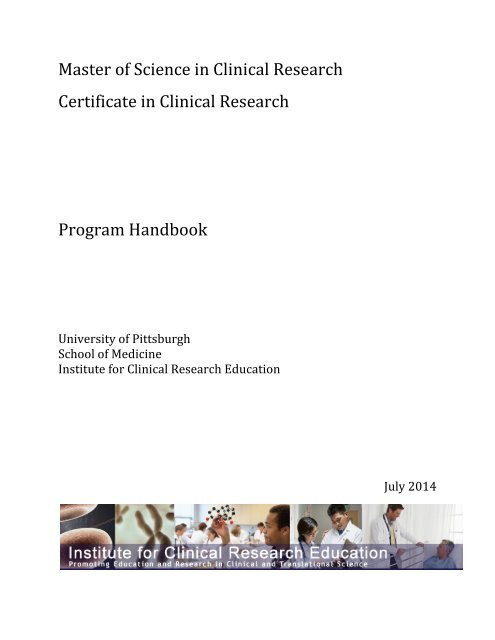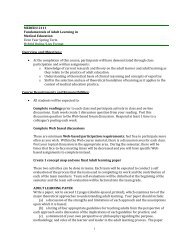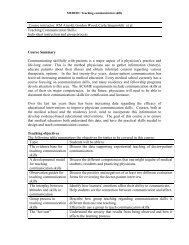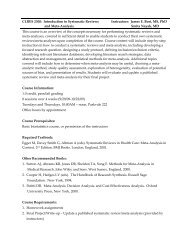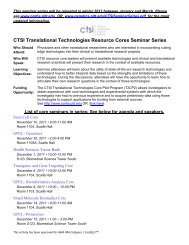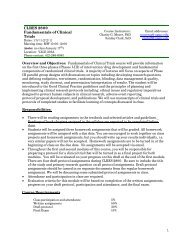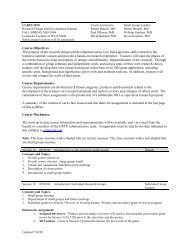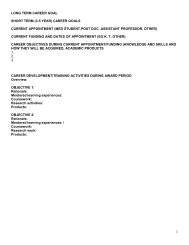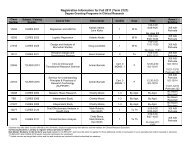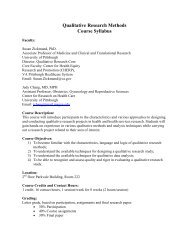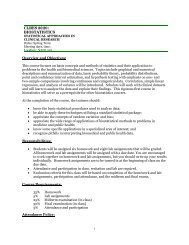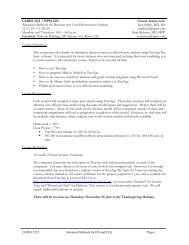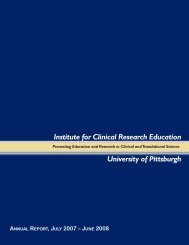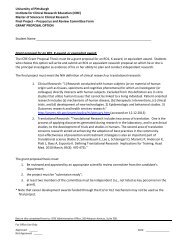Student Handbook - Institute for Clinical Research Education
Student Handbook - Institute for Clinical Research Education
Student Handbook - Institute for Clinical Research Education
Create successful ePaper yourself
Turn your PDF publications into a flip-book with our unique Google optimized e-Paper software.
Master of Science in <strong>Clinical</strong> <strong>Research</strong><br />
Certificate in <strong>Clinical</strong> <strong>Research</strong><br />
Program <strong>Handbook</strong><br />
University of Pittsburgh<br />
School of Medicine<br />
<strong>Institute</strong> <strong>for</strong> <strong>Clinical</strong> <strong>Research</strong> <strong>Education</strong><br />
July 2014
<strong>Institute</strong> <strong>for</strong> <strong>Clinical</strong> <strong>Research</strong> <strong>Education</strong> (ICRE)<br />
Degree Programs in <strong>Clinical</strong> <strong>Research</strong> and <strong>Clinical</strong> and<br />
Translational Science<br />
This handbook provides in<strong>for</strong>mation about the policies and procedures pertaining to the <strong>Clinical</strong><br />
<strong>Research</strong> Degree Programs, the School of Medicine, and the University of Pittsburgh. Although the<br />
material contained within the handbook is reviewed and updated once a year, changes may occur<br />
during the year and are announced in memos, on the website, and by email so that students are<br />
notified in a timely manner.<br />
Degree Granting Programs in <strong>Clinical</strong> <strong>Research</strong> Contact In<strong>for</strong>mation:<br />
<strong>Institute</strong> <strong>for</strong> <strong>Clinical</strong> <strong>Research</strong> <strong>Education</strong><br />
200 Meyran Avenue, Suite 300<br />
Pittsburgh, PA 15213<br />
Phone: 412-692-2686<br />
Fax: 412-586-9672<br />
icre@pitt.edu (email)<br />
The University of Pittsburgh, as an educational institution and as an employer, values equality of<br />
opportunity, human dignity, and racial/ethnic and cultural diversity. Accordingly, the University<br />
prohibits and will not engage in discrimination on the basis of race, color, religion, national origin,<br />
ancestry, sex, age, marital status, family status, sexual orientation, disability, or status as a disabled<br />
veteran or a veteran of the Vietnam era. Further, the University will continue to take affirmative<br />
steps to support and advance these values consistent with the University’s mission. This policy<br />
applies to admissions, employment, and access to and treatment in University programs and<br />
activities. This is a commitment made by the University and is in accordance with federal, state, and<br />
local laws and regulations. All relevant programs are administered by the Office of Affirmative<br />
Action, 901 William Pitt Union, University of Pittsburgh, Pittsburgh, PA 15260. <strong>Student</strong>s, employees,<br />
or applicants should contact the Office of Affirmative Action immediately in all cases in which<br />
discrimination is alleged. For more in<strong>for</strong>mation, call 412-648-7860.<br />
1
Table of Contents<br />
I. Introduction to the ICRE and <strong>Clinical</strong> <strong>Research</strong> Degree Programs ........................................................... 4<br />
A. <strong>Institute</strong> <strong>for</strong> <strong>Clinical</strong> <strong>Research</strong> .............................................................................................................................. 4<br />
B. Degree Granting Programs in <strong>Clinical</strong> <strong>Research</strong> .......................................................................................... 4<br />
II. <strong>Clinical</strong> <strong>Research</strong> Degree Program Requirements ........................................................................................... 5<br />
A. Master of Science in <strong>Clinical</strong> <strong>Research</strong> ............................................................................................................. 5<br />
1. Course Requirements: ........................................................................................................................................ 5<br />
2. Core Curriculum ................................................................................................................................................... 6<br />
3. <strong>Research</strong> Design and Development .............................................................................................................. 6<br />
4. Specialty Tracks (Required) ............................................................................................................................ 6<br />
5. Content Specialization (Optional) ................................................................................................................. 6<br />
6. Comprehensive Competency Review........................................................................................................... 6<br />
7. Thesis or Substantive <strong>Research</strong> Project ...................................................................................................... 6<br />
B. Certificate in <strong>Clinical</strong> <strong>Research</strong> ............................................................................................................................ 8<br />
1. Course Requirements ......................................................................................................................................... 8<br />
2. Core Curriculum ................................................................................................................................................... 8<br />
III. General Academic Program In<strong>for</strong>mation ........................................................................................................ 9<br />
A. Statute of Limitations .............................................................................................................................................. 9<br />
B. Leave of Absence ....................................................................................................................................................... 9<br />
C. Cross Registration ..................................................................................................................................................... 9<br />
D. Waiver of Requirements ........................................................................................................................................ 9<br />
E. Grading Policy............................................................................................................................................................. 9<br />
F. Tuition ......................................................................................................................................................................... 10<br />
G. Building Emergency or Inclement Weather Policy ................................................................................... 10<br />
IV. ICRE Academic Values and Code of Professionalism ............................................................................... 11<br />
V. Guidelines <strong>for</strong> Ethical Practices in <strong>Research</strong> .................................................................................................... 13<br />
VI. ICRE Program Guidelines .................................................................................................................................... 13<br />
A. Attendance ................................................................................................................................................................. 13<br />
B. Course Registration and Academic Advising ............................................................................................... 13<br />
C. CourseWeb ................................................................................................................................................................. 13<br />
D. University of Pittsburgh Email .......................................................................................................................... 14<br />
2
E. Course Evaluation ................................................................................................................................................... 14<br />
F. Required and Supplemental Textbooks ......................................................................................................... 14<br />
VII. Program Governance ............................................................................................................................................. 15<br />
A. Degree Granting Programs in <strong>Clinical</strong> <strong>Research</strong> ........................................................................................ 15<br />
B. <strong>Institute</strong> <strong>for</strong> <strong>Clinical</strong> <strong>Research</strong> <strong>Education</strong> ...................................................................................................... 15<br />
C. University of Pittsburgh School of Medicine Graduate Studies Office .............................................. 16<br />
VIII. Appendices ................................................................................................................................................................ 17<br />
IX. Appendix A: Master of Science in <strong>Clinical</strong> <strong>Research</strong> Plan of Study ..................................................... 18<br />
X. Appendix B: Master of Science in <strong>Clinical</strong> <strong>Research</strong> Content Specialization ....................................... 21<br />
A. Content Specialization in Health Care Disparities and Underserved Community <strong>Research</strong> ... 21<br />
B. Content Specialization in Palliative Care <strong>Research</strong> ................................................................................... 21<br />
XI. Appendix C: Comprehensive Competency Review ................................................................................... 22<br />
XII. Appendix C.i: Written Reflections .................................................................................................................... 23<br />
XIII. Appendix C.ii: Evidence of Competence ......................................................................................................... 23<br />
XIV. Appendix D: Certificate in <strong>Clinical</strong> <strong>Research</strong> Plan of Study ................................................................... 25<br />
XV. Appendix E: ICRE Academic Integrity Pledge ............................................................................................. 26<br />
XVI. Appendix F: ICRE Academic Integrity Violation Reporting Procedure ............................................ 27<br />
XVII. Appendix G: <strong>Student</strong> Obligations ................................................................................................................. 28<br />
XVIII. Appendix H: Faculty Obligations.................................................................................................................. 29<br />
3
I. Introduction to the ICRE and <strong>Clinical</strong> <strong>Research</strong> Degree Programs<br />
A. <strong>Institute</strong> <strong>for</strong> <strong>Clinical</strong> <strong>Research</strong><br />
The <strong>Institute</strong> <strong>for</strong> <strong>Clinical</strong> <strong>Research</strong> <strong>Education</strong> (ICRE) is the home <strong>for</strong> the University of Pittsburgh's<br />
premier clinical and translational research training programs as well as the home <strong>for</strong> the <strong>Research</strong><br />
<strong>Education</strong> and Career Development Core of the <strong>Clinical</strong> and Translational Science <strong>Institute</strong> (CTSI).<br />
The foundation of the ICRE’s clinical research training enterprise consists of the Degree Granting<br />
Programs in <strong>Clinical</strong> <strong>Research</strong>.<br />
• Mission:<br />
The mission of the ICRE is to offer the highest-caliber training and education in clinical research<br />
to all levels of trainees in the Schools of the Health Sciences (SHS) and to enhance collaboration<br />
among trainees from multiple disciplines.<br />
• Objectives<br />
The ICRE's primary objectives are to develop, nurture, and support a cadre of clinical and<br />
translational scientists by building on the University of Pittsburgh's existing clinical research<br />
training programs to establish a comprehensive program with activities ranging from early<br />
research exposure <strong>for</strong> high school students to programs <strong>for</strong> faculty.<br />
B. Degree Granting Programs in <strong>Clinical</strong> <strong>Research</strong><br />
The MS and certificate programs in <strong>Clinical</strong> <strong>Research</strong> at the University Of Pittsburgh School Of<br />
Medicine prepare trainees to learn, design and conduct high-quality clinical and translational<br />
research.<br />
• Objectives<br />
o To attract highly talented individuals from a broad range of disciplines with interest in<br />
clinical and translational research and teach them the critical skills needed to become<br />
successful clinical researchers.<br />
o To provide a rigorous core curriculum encompassing all of the major aspects necessary<br />
<strong>for</strong> the design and conduct of clinical and translational research.<br />
o To offer specialized, methods-based foci that allow trainees to tailor coursework to<br />
meet their individual needs <strong>for</strong> clinical and translational research training.<br />
4
II.<br />
<strong>Clinical</strong> <strong>Research</strong> Degree Program Requirements<br />
A. Master of Science in <strong>Clinical</strong> <strong>Research</strong><br />
To obtain a Master of Science in <strong>Clinical</strong> <strong>Research</strong>, students must complete a minimum of 30 credit<br />
hours of coursework, including the core curriculum in clinical research, the year-long grant-writing<br />
course, required courses <strong>for</strong> one of the specialty tracks focused on research methodologies, and<br />
requirements <strong>for</strong> a thesis or substantive research project. Interested students also may take 6<br />
credit hours of coursework in one of the optional content specializations. Depending on individual<br />
clinical responsibilities and the total number of courses taken, the Master of Science in <strong>Clinical</strong><br />
<strong>Research</strong> generally requires 2 years or more to fulfill all of the requirements. The timing and<br />
scheduling <strong>for</strong> many of the courses in the program are designed to help students balance their<br />
multiple responsibilities.<br />
For University of Pittsburgh regulations regarding Master of Science degrees, see the following<br />
website:<br />
http://www.pitt.edu/~graduate/regmasters.html<br />
1. Course Requirements:<br />
<strong>Student</strong>s must complete the required core curriculum in <strong>Clinical</strong> <strong>Research</strong>. In addition, most<br />
students are required to complete <strong>Research</strong> Design and Development Parts I and II (year- long<br />
grant writing course).<br />
Summer Term Fall Term Spring Term<br />
CLRES 2005: Computer<br />
Methods in <strong>Clinical</strong> <strong>Research</strong> (1<br />
credit)<br />
CLRES 2010: <strong>Clinical</strong> <strong>Research</strong><br />
Methods (3 credits)<br />
CLRES 2020: Biostatistics (4<br />
credits)<br />
CLRES 2040: Measurement in<br />
<strong>Clinical</strong> <strong>Research</strong> (1 credit)<br />
CLRES 2071/2072: <strong>Research</strong> Design and Development Parts I<br />
and II (5 credits)<br />
** This may change to being offered as one 3 credit course in<br />
Fall 2015.<br />
Specialty Track and<br />
Elective Coursework<br />
CLRES 2050: Ethics and<br />
Regulation of <strong>Research</strong> (1 credit)<br />
Specialty Track and Elective<br />
Coursework<br />
5
2. Core Curriculum<br />
The purpose of the core curriculum is to provide trainees with the basic set of skills that are<br />
required by clinical investigators in all fields of interest. These skills include an understanding of<br />
research design, epidemiologic methods, biostatistics, study and survey design, measurement of<br />
outcomes, and ethical and regulatory principles of research involving human subjects. There may<br />
be additional requirements, depending on the specific research training path. The core curriculum<br />
can be taken in its entirety in the summer. It is possible to split the core curriculum over two<br />
summer terms. The Ethics and Regulation of <strong>Research</strong> course is only offered in the spring term. A<br />
detailed plan of study <strong>for</strong> the Master of Science in <strong>Clinical</strong> <strong>Research</strong> can be found in Appendix A.<br />
3. <strong>Research</strong> Design and Development<br />
The <strong>Research</strong> Design and Development course can be taken only after the core curriculum<br />
coursework is completed. It is taken in conjunction with the Ethics and Regulation of <strong>Research</strong><br />
course. The <strong>Research</strong> Design and Development course focuses on research design and development<br />
during the fall and spring terms.<br />
• CLRES 2071 <strong>Research</strong> Design and Development Part I (3 credits, Fall)<br />
• CLRES 2072 <strong>Research</strong> Design and Development Part II (2 credits, Spring)<br />
** This may change to being offered as one course <strong>for</strong> 3 credits in Fall 2015.<br />
4. Specialty Tracks (Required)<br />
<strong>Student</strong>s must elect one of the following specialty tracks (detailed in<strong>for</strong>mation in Appendix A):<br />
• Health Services <strong>Research</strong> (Track Director Mark Roberts, MD, MPP)<br />
• <strong>Clinical</strong> Trials (Track Director Charity Moore, PhD)<br />
• Comparative Effectiveness (Track Director Doug Landsittel, PhD)<br />
• Translational <strong>Research</strong> (To be determined)<br />
5. Content Specialization (Optional)<br />
<strong>Student</strong>s may, if they wish, choose to focus in a particular content specialization. To do this, they<br />
must take 6 credits hours of relevant coursework in one of the following areas (detailed<br />
in<strong>for</strong>mation in Appendix B):<br />
• Health Disparities and Underserved Community <strong>Research</strong><br />
• Palliative Care<br />
6. Comprehensive Competency Review<br />
After completion of 15 credits inclusive of the core (CLRES 2005, CLRES 2010, CLRES 2020, CLRES<br />
2040 and CLRES 2050) and five additional credits, and be<strong>for</strong>e registering <strong>for</strong> any thesis credits,<br />
students will meet with their Specialty Track Director, and one member of the ICRE’s Competency-<br />
Based <strong>Education</strong> Committee <strong>for</strong> a Comprehensive Competency Review (Appendix C).<br />
7. Thesis or Substantive <strong>Research</strong> Project<br />
Individuals pursuing the Master of Science in <strong>Clinical</strong> <strong>Research</strong> are required to complete a <strong>for</strong>mal<br />
thesis or substantive research project. The project will count <strong>for</strong> up to 3 credits and must satisfy the<br />
following requirements:<br />
• Be primarily independent work by the trainee,<br />
6
• receive preliminary approval from both the trainee's advisor and the ICRE Leadership,<br />
• <strong>for</strong>m the basis <strong>for</strong> a comprehensive review of competence by a <strong>for</strong>mal review committee<br />
There are three standard mechanisms that are considered appropriate <strong>for</strong> the substantive research<br />
project (see below), subject to ICRE approval. To obtain approval, the trainee must complete a<br />
Prospectus and Review Committee Form the last day of the term PRIOR to the term you wish to<br />
register <strong>for</strong> CLRES 2080: Masters Thesis <strong>Research</strong> credits. The prospectus must be approved by the<br />
student’s advisor and the Director of Academic Programs be<strong>for</strong>e the student may proceed. The<br />
Prospectus <strong>for</strong>ms are provided to students at the beginning of each term via email or by contacting<br />
the ICRE Degree Program Staff.<br />
The mechanisms <strong>for</strong> the substantive project include:<br />
• A standard thesis option: trainees may elect to complete a master's thesis in their field of<br />
specialty. A thesis produced under this option must con<strong>for</strong>m to all applicable university policies<br />
regarding theses (visit www.pitt.edu/~graduate/etd <strong>for</strong> details on submitting theses<br />
electronically).<br />
• R01, K-award, or equivalent grant application: Eligible students may submit a completed R01 or<br />
equivalent research proposal (<strong>for</strong> which they are the principal investigator) as evidence of their<br />
ability to plan and conduct independent research. To serve as the substantive project <strong>for</strong> the<br />
Master of Science in <strong>Clinical</strong> <strong>Research</strong>, the proposal must be reviewed and approved by the<br />
appropriate scientific review committee in the trainee's department. Note that career<br />
development awards funded through the KL2 or K12 mechanism may not be used as the final<br />
project.<br />
• Peer review publications: The compilation of two completed first author papers related to the<br />
trainee's research may be used as evidence of independent work at the discretion of the<br />
individual specialty track. The papers must be original research papers and be written in a<br />
competitive manner. Each paper must be reviewed by at least 2 committee members who are<br />
not coauthors. At least one member of the committee must be independent (i.e., not a coauthor<br />
on either paper), and no committee member (except the trainee’s mentor) can be a coauthor on<br />
both papers.<br />
Each of the options listed above must be reviewed and defended be<strong>for</strong>e a review committee, and<br />
members of the committee must be identified when the trainee submits the prospectus and review<br />
committee <strong>for</strong>m <strong>for</strong> approval. The ICRE Review Committee is chaired by your ICRE academic<br />
advisor (or another ICRE faculty member named by the advisor). The Committee also must include<br />
your mentor, another ICRE faculty member, and at least one ad hoc member familiar with your<br />
project. The ICRE committee member will determine if an additional reviewer with statistical or<br />
other methodological expertise is necessary.<br />
7
The trainee's presentation to the review committee should be scheduled at least two months<br />
prior to graduation to allow enough time <strong>for</strong> revisions and subsequent reviews. Once approval is<br />
granted by the review committee and <strong>for</strong>mal documentation is submitted to the ICRE, the trainee<br />
will receive a passing grade and will be permitted to proceed with the graduation ceremonies.<br />
B. Certificate in <strong>Clinical</strong> <strong>Research</strong><br />
To obtain a Certificate in <strong>Clinical</strong> <strong>Research</strong>, students must complete a minimum of 15 credit hours<br />
of coursework, including the core curriculum in clinical research and 5 elective credits. Depending<br />
on individual clinical responsibilities and the total number of courses taken, the Certificate in<br />
<strong>Clinical</strong> <strong>Research</strong> generally requires 1 - 2 years of study to fulfill all the requirements; students have<br />
up to 4 years though to complete. The timing and scheduling <strong>for</strong> many of the courses in the<br />
program are designed to help students balance their multiple responsibilities. In addition to the<br />
regular Certificate in <strong>Clinical</strong> <strong>Research</strong>, there is also the Certificate in <strong>Clinical</strong> and Translational<br />
Science <strong>for</strong> Doctoral <strong>Student</strong>s in the Health Sciences (CTS Certificate). This certificate is <strong>for</strong> other<br />
PhD students in any of the Schools of Health Sciences and is completed in conjunction with their<br />
doctoral degree.<br />
1. Course Requirements<br />
<strong>Student</strong>s must complete the required core curriculum in <strong>Clinical</strong> <strong>Research</strong>. In addition, they are<br />
required to take 5 additional credits of elective coursework. A Plan of Study can be found in<br />
Appendix D.<br />
Summer Term Fall Term Spring Term<br />
CLRES 2005: Computer<br />
Methods in <strong>Clinical</strong> <strong>Research</strong> (1<br />
credit)<br />
CLRES 2010: <strong>Clinical</strong> <strong>Research</strong><br />
Methods (3 credits)<br />
CLRES 2020: Biostatistics (4<br />
credits)<br />
CLRES 2040: Measurement in<br />
<strong>Clinical</strong> <strong>Research</strong> (1 credit)<br />
Elective Credits<br />
CLRES 2050: Ethics and<br />
Regulation of <strong>Research</strong> (1 credit)<br />
2. Core Curriculum<br />
The purpose of the core curriculum is to provide trainees with the basic set of skills that are<br />
required by clinical investigators in all fields of interest. These skills include an understanding of<br />
research design, epidemiologic methods, biostatistics, study and survey design, measurement of<br />
outcomes, and ethical and regulatory principles of research involving human subjects. The core<br />
curriculum can be taken in its entirety in the summer. It is possible to split the core curriculum<br />
coursework over two summer terms. The Ethics and Regulation of <strong>Research</strong> course is only offered<br />
in the spring term.<br />
8
III.<br />
General Academic Program In<strong>for</strong>mation<br />
A. Statute of Limitations<br />
It is University policy that students complete the Certificate or Master of Science degree in four (4)<br />
years. Under extraordinary circumstances, students may apply <strong>for</strong> an extension of the statute of<br />
limitations. The request must be approved by the Director, Program Leadership, and the Dean.<br />
B. Leave of Absence<br />
Under special conditions, a student in the Master of Science program may be granted one leave of<br />
absence <strong>for</strong> a maximum amount of 1 year. When requesting a leave of absence, the student must<br />
state the rationale and must indicate the requested length of leave in advance. The request should<br />
be submitted to the Director, who in turn will make a recommendation to the Associate Dean. If<br />
approved by the Associate Dean, the time of the leave shall not count against the total time allowed<br />
<strong>for</strong> the degree being sought by the student.<br />
C. Cross Registration<br />
<strong>Student</strong>s may register <strong>for</strong> courses offered at institutions in the Pittsburgh Council on Higher<br />
<strong>Education</strong> (PCHE) cross-registration agreement (Carnegie Mellon, Duquesne University, the<br />
Pittsburgh Theological Seminary, and Robert Morris University.) Such coursework must be<br />
approved in advance by the student’s advisor. Credits will not be counted as transfers and will<br />
count toward the degree and GPA calculations.<br />
D. Waiver of Requirements<br />
If a student feels that his or her educational background precludes the need to take one or more of<br />
the required courses, the student should discuss this with their ICRE advisor and the Director of<br />
Academic Programs. The student is responsible to bring this matter to the attention of the Director<br />
of Academic Programs. The student will need to have the syllabi from the courses they feel meet<br />
the requirements. The Director of Academic Programs is responsible <strong>for</strong> granting the waiver and in<br />
special circumstances may request the advice of the course director. In some cases, the student<br />
may receive permission to take an examination to be exempted from a course.<br />
E. Grading Policy<br />
The following guidelines are based on University policy:<br />
• Graduate students must maintain a minimum grade point average (GPA) of 3.0 or better at all<br />
times. Failure to do so results in automatic academic probation.<br />
• Graduate students must receive satisfactory grades in each course. For required courses, a<br />
letter grade of “B” or better is needed. For elective courses, a letter grade of “B –”can count<br />
towards fulfillment of degree requirements, subject to approval by the Director of Academic<br />
Programs.<br />
• If a student receives a letter grade that falls below these thresholds (“B” <strong>for</strong> required courses, “B<br />
–” <strong>for</strong> elective courses), no course credit will be given. The University will not count these<br />
courses towards requirements. The student has the option to re-take these courses. <strong>Student</strong>s<br />
must officially enroll and pay <strong>for</strong> the class again. A repeated course, has a notation appearing<br />
9
underneath the previous course taken designating it has been excluded from the GPA. The<br />
course and grade remains on your record/transcript.<br />
• “G” and “I” Grades:<br />
o A "G" grade is given by an instructor when class work is unfinished because of<br />
extenuating personal circumstances. When given a "G" grade, you are usually instructed<br />
to complete some clearly defined work (e.g. a final examination paper) within a<br />
specified period of time. The "G" must be completed no later than one year after the<br />
term or session in which the class was taken. You should not request or be given a "G"<br />
grade if, in actuality, you need to repeat the course. See "Course Repeat" <strong>for</strong> more<br />
in<strong>for</strong>mation. Once the deadline has passed, a "G" grade will remain on your record and<br />
you will be required to register <strong>for</strong> the class again, if the class is needed to fulfill<br />
requirements <strong>for</strong> graduation. Contact your instructor <strong>for</strong> details regarding the issuance<br />
of a "G" grade.<br />
o An "I" grade is also issued by the instructor, and differs from a "G" grade. It is issued in<br />
the case of ongoing study such as incomplete research, work in individual guidance<br />
classes, clinical work or seminars.<br />
• “W” Grade: To withdraw from a class after the official end of the add/drop period while still<br />
enrolled in other courses, you must process a Monitored Withdrawal Request <strong>for</strong>m through the<br />
dean's office of the academic center offering the course. If approved, a grade of "W" will be<br />
recorded on your transcript <strong>for</strong> that course. "W" grades do not count toward a student's degree<br />
or grade point average. There is no tuition adjustment associated with a course withdrawal.<br />
F. Tuition<br />
<strong>Student</strong>s are responsible <strong>for</strong> covering the tuition costs, taxes, and fees associated with courses<br />
taken through the <strong>Institute</strong> <strong>for</strong> <strong>Clinical</strong> <strong>Research</strong> <strong>Education</strong> unless they have other funding sources.<br />
The <strong>Institute</strong> <strong>for</strong> <strong>Clinical</strong> <strong>Research</strong> <strong>Education</strong> does not provide financial aid. Current tuition rates <strong>for</strong><br />
graduate-level courses at the University of Pittsburgh can be viewed at:<br />
http://www.ir.pitt.edu/tuition/index.html<br />
Many individuals accepted into our degree-granting programs have faculty- or student-based<br />
affiliations with the University of Pittsburgh or University of Pittsburgh Medical Center (UPMC).<br />
Faculty, fellows, or residents at these institutions may be eligible <strong>for</strong> tuition benefits. For complete<br />
in<strong>for</strong>mation, contact the Faculty Records office at the University of Pittsburgh (412-624-4232) or<br />
UPMC Tuition Assistance Employee Service Center at 1-800-994-2752 (press option 3).<br />
G. Building Emergency or Inclement Weather Policy<br />
Scenario 1: The University is closed; the School of Medicine is closed.<br />
Scenario 2: The University cancels classes; the School of Medicine cancels classes.<br />
Scenario 3: The Parkvale Building is closed or instructor must cancel class due to extenuating<br />
circumstances.<br />
• Only the Chancellor may officially close the Pittsburgh campus of the University.<br />
10
• The University will remain open in all but the most extreme circumstances. However,<br />
University employees and students are urged to use their own discretion in deciding whether<br />
they can safely commute to work.<br />
• When a State of Emergency is declared by the Governor or other local governing official, school<br />
personnel are expected to abide by those directives, and there will be no classes.<br />
• ICRE Degree Program staff will contact students as soon as possible if the Parkvale Building or<br />
instructor cancels class. It is up to the instructor to decide if a make-up session <strong>for</strong> the missed<br />
class will be scheduled and/or required.<br />
IV.<br />
ICRE Academic Values and Code of Professionalism<br />
The University of Pittsburgh and the <strong>Institute</strong> <strong>for</strong> <strong>Clinical</strong> <strong>Research</strong> <strong>Education</strong> (ICRE) maintain an<br />
honor code <strong>for</strong> all students enrolled in educational programs. The ICRE expects all students to<br />
uphold the following values <strong>for</strong> academic integrity and Code of Professionalism. Please note that<br />
specific academic integrity policies may vary from instructor to instructor; it is up to the student to<br />
understand and follow each instructor’s policy and expectations.<br />
Every student shall be honor bound to refrain from cheating, from presenting<br />
work <strong>for</strong> evaluation which is not his or her own, from giving or obtaining<br />
unauthorized assistance during evaluation, and from falsifying data or reports.<br />
Every student shall be honor bound from lying under any circumstances. Every<br />
student has an obligation to cooperate in the investigation or disposition of any<br />
allegation of violation of the Honor Code and to report all violations which come<br />
under his or her observation.<br />
<strong>Student</strong>s sign and return the ICRE Academic Integrity Pledge at Orientation (Appendix F) and if<br />
found in violation of the ICRE Academic Integrity Policy will follow the steps outlined in the ICRE<br />
Academic Integrity Violation Reporting Procedure (Appendix G). In addition to these documents,<br />
students may refer to our <strong>Student</strong> Obligations (Appendix H) and Instructor Obligations (Appendix<br />
I).<br />
A. Academic Integrity*<br />
Examples of conduct which have been regarded as being in violation of academic integrity include<br />
but are not limited to the following:<br />
• Plagiarism<br />
• Representing the work of another as one’s own<br />
• Destroying or concealing educational materials meant <strong>for</strong> simultaneous use by others<br />
• Copying from an examination paper of another student<br />
• Allowing another to copy from one's examination paper<br />
• Reading a copy of the examination prior to the date of the examination without consent of the<br />
instructor<br />
• Giving or receiving aid on an examination under circumstances in which a reasonable<br />
person should have known that such aid was prohibited by the Honor Code<br />
• Using unauthorized resources in the completion of an examination<br />
11
If a student, commits a dishonorable act, it shall be considered a valid defense if the student reports<br />
himself or herself to an appropriate authority and conscientiously attempts to rectify the situation,<br />
be<strong>for</strong>e the dishonorable act is brought to the attention of the program. Any student, faculty<br />
member, administrative officer, or staff member of the ICRE may allege that a violation of academic<br />
integrity has occurred. Alleged violations should be brought to the attention of the Director of<br />
Academic Programs immediately. The Director of Academic Programs will review the alleged<br />
violation and follow the ICRE’s academic integrity violation reporting procedure. A written copy of<br />
the procedure may be obtained from the Degree Program Coordinator at any time.<br />
B. Code of Professionalism*<br />
Honesty<br />
In all situations, classroom, lab, and office, the student should be honest with, faculty members, and<br />
other students. Cheating, plagiarism, theft, and lying are all <strong>for</strong>ms of dishonest behavior.<br />
Fairness<br />
Classroom and research expectations should be clearly stated and met. The student has the right to<br />
expect fairness in treatment, just as the teaching faculty expects to receive fair treatment. Unfair<br />
behavior is not acceptable just because someone else displays such behavior.<br />
Respect<br />
Show respect <strong>for</strong> your teaching faculty and fellow students by attending each class, showing up on<br />
time, and staying <strong>for</strong> the entire class. Pay attention to the discussion and contribute meaningful<br />
responses.<br />
Responsibility<br />
Take responsibility <strong>for</strong> your actions. Discourage dishonest behaviors and dishonest activities in<br />
others.<br />
Communication<br />
In<strong>for</strong>m instructors or degree program staff in a timely manner when experiencing any issues that<br />
may impact your studies.<br />
* Adapted from the University of Pittsburgh School of Medicine ‘<strong>Student</strong> Code of Professionalism’<br />
and the School of Medicine Program in Integrative Molecular Biology (PIMB) <strong>Student</strong> <strong>Handbook</strong><br />
12
V. Guidelines <strong>for</strong> Ethical Practices in <strong>Research</strong><br />
The University of Pittsburgh seeks excellence in the pursuit of knowledge and requires all members<br />
of the University community, including its student body, to adhere to the highest standards of<br />
integrity in research. Detailed in<strong>for</strong>mation regarding the <strong>Research</strong> Integrity Policy at the University<br />
of Pittsburgh can be found at:<br />
http://www.bc.pitt.edu/policies/policy/11/11-01-01.html<br />
More detailed in<strong>for</strong>mation on the Guidelines <strong>for</strong> Ethical Practices in <strong>Research</strong> at the University of<br />
Pittsburgh Guidelines can be found at:<br />
http://www.pitt.edu/~provost/ethresearch.html<br />
VI.<br />
ICRE Program Guidelines<br />
A. Attendance<br />
Attendance is required of all students in degree-granting programs at ICRE. A computerized sign-in<br />
attendance system has been designed to collect attendance <strong>for</strong> all courses held in the Parkvale<br />
Building. All students must sign-in be<strong>for</strong>e entering the classroom at computers that can be found in<br />
the lobby area on the second and third floor of the Parkvale Building. <strong>Student</strong>s can begin to sign-in<br />
30 minutes be<strong>for</strong>e the scheduled class time up to the end of class. If you experience trouble with<br />
the sign-in, you should contact your course instructor to ensure you are given credit <strong>for</strong> attending<br />
class. Courses held in buildings other than the Parkvale Building may have a paper sign-in sheet<br />
distributed during class.<br />
If a student is not listed on the computerized sign-in roster <strong>for</strong> a course to which they are<br />
registered, they must add their name to the roster by clicking the link to add a member to the roster<br />
found at the bottom of the sign-in page.<br />
Watching a video of a recorded lecture does not substitute <strong>for</strong> attendance. Attendance exceptions<br />
are made at the instructor’s discretion.<br />
B. Course Registration and Academic Advising<br />
<strong>Student</strong>s are required to meet with their academic advisor (assigned to them at Orientation) each<br />
term. <strong>Student</strong>s are expected to come prepared when meeting with their advisor, students should<br />
take with them a blank enrollment <strong>for</strong>m, a list of proposed classes and be prepared to discuss their<br />
degree progression. <strong>Student</strong>s cannot register <strong>for</strong> classes unless they have a signed enrollment <strong>for</strong>m.<br />
C. CourseWeb<br />
Most, but not all, ICRE courses are made available on the University of Pittsburgh CourseWeb<br />
system. Available course materials include syllabi, announcements, and, <strong>for</strong> some courses, audio,<br />
audio with PowerPoint, and/or video recordings of the lectures.<br />
CourseWeb courses will be available sometime in the two week period be<strong>for</strong>e the start of the<br />
course, depending on availability of in<strong>for</strong>mation. At course completion, the CourseWeb site will<br />
13
continue to be accessible <strong>for</strong> two weeks after the last day of class. This extension provides enrolled<br />
students with an opportunity to save any files made available <strong>for</strong> the course. There will be no access<br />
to the course in<strong>for</strong>mation after that time unless an exemption is permitted by the instructor.<br />
D. University of Pittsburgh Email<br />
CourseWeb and all official University of Pittsburgh correspondence are directed to the student’s<br />
University of Pittsburgh email address (username@pitt.edu). <strong>Student</strong>s are responsible either <strong>for</strong><br />
reading email at their University of Pittsburgh email address or <strong>for</strong> <strong>for</strong>warding email messages to<br />
an email account that the student regularly uses.<br />
For in<strong>for</strong>mation on <strong>for</strong>warding your University of Pittsburgh email, see the University Email Help<br />
page at:<br />
http://technology.pitt.edu/help/help-index/email-accounts-help.html<br />
E. Course Evaluation<br />
All students are expected to complete a course evaluation survey at the end of each ICRE course.<br />
Course evaluations are distributed electronically on the last day of class and available <strong>for</strong> two<br />
weeks. All responses are confidential and will be presented to the instructor without any<br />
identification of the responder.<br />
F. Required and Supplemental Textbooks<br />
All required and supplemental textbooks can be purchased at the University of Pittsburgh Book<br />
Center:<br />
http://www.pitt.edu/~bookctr/<br />
The ICRE Reference Library (Parkvale Building, Suite 300, Room 306) has a collection of required<br />
and supplemental textbooks <strong>for</strong> ICRE courses. The books in the ICRE Reference Library are<br />
available <strong>for</strong> students to read in the Parkvale building only.<br />
14
VII. Program Governance<br />
A. Degree Granting Programs in <strong>Clinical</strong> <strong>Research</strong><br />
Charity Moore, PhD<br />
Director of Degree Granting Programs<br />
Director of the Core Curriculum<br />
327 Parkvale<br />
412-246-6961<br />
moorecg@upmc.edu<br />
Jennifer Holliman, MPA<br />
Program Coordinator<br />
306 Parkvale Building<br />
412-586-9673<br />
hollimanjm@upmc.edu<br />
TBD<br />
<strong>Student</strong> Services Coordinator<br />
300 Parkvale Building<br />
412-692-2686<br />
Lauren Talotta<br />
Instructional Technologist<br />
300 Parkvale Building<br />
412-586-9629<br />
talottals@upmc.edu<br />
B. <strong>Institute</strong> <strong>for</strong> <strong>Clinical</strong> <strong>Research</strong> <strong>Education</strong><br />
Wishwa N. Kapoor, MD, MPH<br />
Director<br />
Doris M. Rubio, PhD<br />
Co- Director<br />
Georgeanna Robinson, EdD<br />
Assistant Director<br />
300 Parkvale<br />
412-864-3024<br />
Patrick M. Reitz, MA<br />
Administrator<br />
304 Parkvale<br />
412-692-2018<br />
15
C. University of Pittsburgh School of Medicine Graduate Studies Office<br />
Arthur S. Levine, MD<br />
Senior Vice Chancellor of Health Sciences<br />
Dean of the School of Medicine<br />
401 Scaife Hall<br />
412-648-8975<br />
alevine@hs.pitt.edu<br />
John P. Horn, PhD<br />
Associate Dean of Graduate Studies<br />
524 Scaife Hall<br />
412-648-8957<br />
jph@pitt.edu<br />
Joyce D’Antonio, PhD<br />
Director<br />
524 Scaife Hall<br />
412-648-9786<br />
jad155@pitt.edu<br />
Clare Gauss<br />
Administrative Specialist<br />
524 Scaife Hall<br />
412-383-7965<br />
cgauss@medschool.pitt.edu<br />
Susanna Godwin<br />
Administrative Specialist<br />
524 Scaife Hall<br />
412-383-8716<br />
sgodwin@medschool.pitt.edu<br />
Jennifer Walker<br />
Assistant Director<br />
524 Scaife Hall<br />
412-383-7866<br />
jennifer@medschool.pitt.edu<br />
Carol Williams<br />
Admissions & Recruiting Coordinator<br />
524 Scaife Hall<br />
412-648-9003<br />
cawillia@medschool.pitt.edu<br />
16
VIII. Appendices<br />
Appendix A: Master of Science in <strong>Clinical</strong> <strong>Research</strong> Plan of Study<br />
Appendix B: Master of Science Content Specialization<br />
Appendix C: Comprehensive Competency Review<br />
Appendix D: Certificate in <strong>Clinical</strong> <strong>Research</strong> Plan of Study<br />
Appendix E: ICRE Academic Integrity Pledge<br />
Appendix F: ICRE Academic Integrity Violation Form<br />
Appendix G: <strong>Student</strong> Obligations<br />
Appendix H: Faculty Obligations<br />
17
IX.<br />
Appendix A: Master of Science in <strong>Clinical</strong> <strong>Research</strong> Plan of Study<br />
Trainees must successfully complete the required courses plus additional elective courses, selected<br />
with the trainee’s advisor, which are necessary to earn the Master of Science in <strong>Clinical</strong> <strong>Research</strong><br />
<strong>Education</strong>. The Master of Science trainee must select a track. Once the track has been selected, the<br />
trainee must take the required courses <strong>for</strong> that track. The trainee may select courses from the<br />
suggested track elective list or electives of their choosing.<br />
Required Core plus <strong>Research</strong> Design and Development Seminar<br />
Course<br />
Number<br />
Course Title<br />
Required/<br />
Elective<br />
Credits<br />
CLRES 2005 Computer Methods in <strong>Clinical</strong> <strong>Research</strong> Required 1<br />
CLRES 2010 <strong>Clinical</strong> <strong>Research</strong> Methods Required 3<br />
CLRES 2020<br />
Biostatistics: Statistical Approaches in <strong>Clinical</strong><br />
<strong>Research</strong><br />
Required 4<br />
CLRES 2040 Measurement in <strong>Clinical</strong> <strong>Research</strong> Required 1<br />
CLRES 2050 Ethics and Regulation of <strong>Clinical</strong> <strong>Research</strong> Required 1<br />
CLRES 2071* <strong>Research</strong> Design and Development Part I Required 3<br />
CLRES 2072* <strong>Research</strong> Design and Development Part II Required 2<br />
Total Credits 15<br />
* This course may be combined into one section <strong>for</strong> 3 credits beginning Fall 2015.<br />
<strong>Clinical</strong> Trials <strong>Research</strong> Track<br />
Course<br />
Number<br />
Course Title<br />
Required/ Elective<br />
Credits<br />
CLRES 2080 Master’s Thesis <strong>Research</strong> Required 1-3<br />
CLRES 2120 Cost-Effectiveness Analysis in Health Care Required 1<br />
CLRES 2800 Fundamentals in <strong>Clinical</strong> Trials Required 1<br />
CLRES 2810 Statistical Methods & Issues in <strong>Clinical</strong> Trials Required 1<br />
CLRES 2820 Special Topics in <strong>Clinical</strong> Trials Required 1<br />
Total Credits 7<br />
18
Comparative Effectiveness <strong>Research</strong> Track<br />
Course<br />
Number<br />
Course Title<br />
Required/ Elective<br />
Credits<br />
CLRES 2080 Master's Thesis <strong>Research</strong> Required 1-3<br />
CLRES 2107 Comparative Effectiveness <strong>Research</strong> Required 2<br />
CLRES 2108<br />
Electronic Health Records and Developing<br />
Patient Registries<br />
Required 1<br />
CLRES 2109 Design of CER Studies Required 1<br />
CLRES 2120 Cost-Effectiveness Analysis Required 1<br />
CLRES 2121 <strong>Clinical</strong> Decision Analysis Required 1<br />
CLRES 2300<br />
Introduction to Systematic Review and Meta-<br />
Analysis<br />
Required 1<br />
CLRES 2800 Fundamentals of <strong>Clinical</strong> Trials Required 1<br />
Total Credits 11<br />
Health Services <strong>Research</strong> Track<br />
Course<br />
Number<br />
Course Title Required/ Elective Credits<br />
CLRES 2080<br />
Master’s Thesis <strong>Research</strong><br />
Required 1-3<br />
CLRES 2021 Analysis of Variance (ANOVA) and Regression Required 1<br />
CLRES 2022<br />
Logistic Regression<br />
Required 1<br />
CLRES 2023<br />
Survival Analysis<br />
Required 1<br />
CLRES 2026<br />
Analysis of Correlated Data<br />
Required 1<br />
CLRES 2107 Comparative Effectiveness <strong>Research</strong> Required 2<br />
CLRES 2120<br />
Cost-Effectiveness Analysis in Health Care<br />
Required 1<br />
Total Credits 10<br />
19
Translational <strong>Research</strong> Track<br />
Course<br />
Number<br />
Course Title Required/ Elective Credits<br />
CLRES 2080<br />
Master’s Thesis <strong>Research</strong><br />
Required 1-3<br />
CLRES 2021 Analysis of Variance (ANOVA) and Regression Required 1<br />
CLRES 2022<br />
CLRES 2700<br />
CLRES 2725<br />
PHARM<br />
3140 *<br />
Logistic Regression<br />
Fundamentals of Bench <strong>Research</strong><br />
Translational <strong>Research</strong> Practicum<br />
Introduction to Translational <strong>Research</strong> in the<br />
Health Sciences<br />
Required 1<br />
Required 3<br />
Required 1-2<br />
Required 2<br />
Total Credits 10<br />
* <strong>Student</strong>s may opt out of this course<br />
20
X. Appendix B: Master of Science in <strong>Clinical</strong> <strong>Research</strong> Content<br />
Specialization<br />
Trainees pursuing the Master of Science in <strong>Clinical</strong> <strong>Research</strong> must choose a specialty track and<br />
may also choose to further focus their research by taking 6 credits of coursework <strong>for</strong> an optional<br />
content specialization and submitting a research paper in that area. Two content specializations<br />
are currently available. For more in<strong>for</strong>mation:<br />
http://www.icre.pitt.edu/degrees/cs.html<br />
A. Content Specialization in Health Care Disparities and Underserved<br />
Community <strong>Research</strong><br />
This content specialization is designed to provide advanced training in health services research<br />
that focuses on underserved populations and health care disparities. Courses chosen from the<br />
following list will provide trainees with skills and analytic methods that are appropriate <strong>for</strong><br />
disparities and community-based research and will help trainees identify and address problems<br />
facing underserved communities. Larissa Myaskovsky, PhD, is the point of contact <strong>for</strong> this content<br />
specialization: http://www.dom.pitt.edu/dgim/faculty_info.aspxfp=5457.<br />
Required Courses:<br />
• CLRES 2200: Introduction to <strong>Research</strong> on Disparities in Health Care (2cr, Fall Term)<br />
• MEDEDU 2240: Cultural Competence in Medical <strong>Education</strong> (1cr, Spring term)<br />
B. Content Specialization in Palliative Care <strong>Research</strong><br />
This content specialization is designed to provide trainees with the following: didactic training in a<br />
broad spectrum of research methodologies, technologies, and tools; exposure to multidisciplinary<br />
research teams, hands-on mentored experience in conducting patient-oriented research; and the<br />
conceptual and writing skills necessary to submit competitive grant applications <strong>for</strong> successful,<br />
long-term patient-oriented research careers. Robert Arnold, MD, is the point of contact <strong>for</strong> this<br />
content specialization: http://www.dom.pitt.edu/dgim/faculty_info.aspxfp=4804.<br />
Required Courses:<br />
• CLRES 2601: Principles and Practice in Palliative Care Part I (1cr, Summer term)<br />
• CLRES 2602: Principles and Practice in Palliative Care Part II (1cr, Fall term)<br />
• CLRES 2610: <strong>Research</strong> Methods in Palliative Care (1cr, Spring term)<br />
21
XI.<br />
Appendix C: Comprehensive Competency Review<br />
The MS in clinical research is intended to train you in the skills, knowledge and professional norms<br />
appropriate <strong>for</strong> clinical researchers, with a specialization in one of four tracks. To help students be<br />
confident that they are on track to develop competence in all the key areas, the Comprehensive<br />
Competency Review (CCR) meeting takes place at the midpoint of the degree.<br />
Timing:<br />
<strong>Student</strong>s who are completing the masters in 2 years will arrange their CCR meeting around the end<br />
of their second semester, usually prior to completing class registration <strong>for</strong> the following academic<br />
year. <strong>Student</strong>s who plan to take more than 2 years to earn their degree will have their meeting<br />
around the time they complete 15 credits.<br />
Process:<br />
<strong>Student</strong>s provide written answers to 3 questions (Appendix C.i) that ask students to reflect on their<br />
learning in the program thus far. These answers should be no more 250 words, and can be bullet<br />
points. They also gather 1 piece of evidence <strong>for</strong> each of the 11 competencies, which should also be<br />
no more than 1 page each (Appendix C.ii).<br />
The committee reviews the evidence and written statements prior to the meeting. During the<br />
meeting, faculty discuss with the student why they chose specific pieces of evidence, concentrating<br />
on pieces that may not show the highest level of competence, or where some explanation is<br />
required. Faculty encourage the student to reflect on their learning and areas <strong>for</strong> improvement in<br />
the second half of the program, guided by the students’ written answers.<br />
Finally, the committee and the student discuss the student’s thesis plans, ensuring that necessary<br />
skills and knowledge can be gained from the classes the student intends to take.<br />
At the end of the meeting, the student steps out <strong>for</strong> a short period of committee discussion. The<br />
track director completes the Comprehensive Review Form, detailing areas of competence and areas<br />
<strong>for</strong> improvement, agreed steps <strong>for</strong> improvement, courses the student should take, and focus of<br />
thesis. All committee members and the student sign the <strong>for</strong>m, and the track director indicates<br />
whether the student has passed the review.<br />
Committee:<br />
• Specialty Track Director and,<br />
• a member of the ICRE’s CBE committee (Drs. Fowler, Kapoor, McTigue, Moore, Robinson).<br />
Organization:<br />
<strong>Student</strong>s are responsible <strong>for</strong> the scheduling of their CR meetings. <strong>Student</strong>s must provide the<br />
committee with electronic copies of their documents (as a single file) at least 1 week be<strong>for</strong>e their<br />
meeting. Track directors are responsible <strong>for</strong> delivering the completed CR Form to the degree<br />
program coordinator.<br />
22
Unsatisfactory Review:<br />
<strong>Student</strong>s who do not pass the CR will develop, with their track director, an appropriate course of<br />
action to ensure that they are on course to become competent by graduation. <strong>Student</strong>s will be<br />
offered the chance to create a new set of evidence and write new reflections of their learning within<br />
six months of the original meeting. <strong>Student</strong>s will not be able to register <strong>for</strong> any thesis credits until<br />
they have passed the CR. <strong>Student</strong>s will be strongly discouraged from taking CLRES 2071/2072 until<br />
they have passed the CR.<br />
XII. Appendix C.i: Written Reflections<br />
These questions are intended to make you think about your learning in the MS program thus far.<br />
Include in your answers any thoughts or comments that you think are relevant to your progress<br />
and overall development as a clinical researcher.<br />
1. What is the most important skill (not knowledge) that you have acquired in the program<br />
Describe why the skill is important to your career as a clinical researcher, and what has<br />
contributed to your learning in this area.<br />
2. Where do you feel you need to focus your learning to achieve broad competence as a clinical<br />
researcher<br />
Describe why you need this skill set or knowledge, how you will acquire it, and how you<br />
became aware that you are not yet competent in this area.<br />
3. What have been the greatest challenges to you in the program so far<br />
Consider specific areas of knowledge, skill sets, or experiences that have caused you difficulty.<br />
Describe the steps you will take to overcome these challenges in the second half of your<br />
program.<br />
XIII. Appendix C.ii: Evidence of Competence<br />
Select one piece of evidence from each of the clinical research competencies, found at<br />
(http://www.icre.pitt.edu/cbe/competencies.html or as described in the Masters Thesis Rubric).<br />
Each piece of evidence should be no more than 1 page, so it could be part of a longer paper, a<br />
section from homework, a slide from a talk, etc. In selecting your evidence and thinking about the<br />
competencies, consider the following points and be prepared to answer any of these questions with<br />
your CR committee:<br />
• What have you learned<br />
• Why is this learning important<br />
• Why did you choose these particular pieces of evidence<br />
• What work did you consider as evidence and then not include Why<br />
• What is there still left to work on within this competency How will you do that<br />
• What is your strength in this competency that these pieces demonstrate<br />
23
• What about this competency has been difficult to acquire<br />
• Why do you think this competency and what you have demonstrated is important <strong>for</strong><br />
clinical research<br />
• How will you apply the competency you have demonstrated in your professional life<br />
• How do you feel about deepening your mastery of this competency<br />
• How have your different learning experiences (writing, discussions, critiques, reading)<br />
come together as an integrated whole, and how will that integration deepen as you apply<br />
this competency<br />
24
XIV. Appendix D: Certificate in <strong>Clinical</strong> <strong>Research</strong> Plan of Study<br />
Trainees must successfully complete 15-credits as a minimum requirement <strong>for</strong> the Certificate in<br />
<strong>Clinical</strong> <strong>Research</strong>. 10 of the 15 credits will be completed within the core curriculum courses and 5<br />
credits of elective courses, which are approved by the student’s advisor.<br />
Course<br />
Number Course Title Required/Elective Credits<br />
CLRES 2005 Computer Methods in <strong>Clinical</strong> <strong>Research</strong> Required 1<br />
CLRES 2010 <strong>Clinical</strong> <strong>Research</strong> Methods Required 3<br />
CLRES 2020<br />
Biostatistics: Statistical Approaches in <strong>Clinical</strong><br />
<strong>Research</strong><br />
Required 4<br />
CLRES 2040 Measurement in <strong>Clinical</strong> <strong>Research</strong> Required 1<br />
CLRES 2050 Ethics and Regulation of <strong>Clinical</strong> <strong>Research</strong> Required 1<br />
Electives Electives Elective 5<br />
Total Credits 15<br />
25
XV.<br />
Appendix E: ICRE Academic Integrity Pledge<br />
I ICRE Academic Integrity and Code of Professionalism Pledge<br />
<strong>Student</strong> Obligations:<br />
1. <strong>Student</strong>s should recognize their responsibility to uphold the ICRE Honor Code and Code of<br />
Professionalism (provided to you at Orientation, and included the student handbook<br />
available to all students online) and the academic policies <strong>for</strong> each course presented on the<br />
first day of class. If a student does not understand or disagrees with any of these policies, it<br />
is their responsibility to meet with the course instructor and, if needed, ICRE Director of<br />
Academic Programs.<br />
2. Each student is required to sign the ICRE Academic Integrity and Code of Professionalism<br />
Pledge at Orientation. If a student does not sign and return the <strong>for</strong>m he/she will be unable<br />
to receive a grade <strong>for</strong> their courses and will be considered in violation of the ICRE’s<br />
Academic Integrity policy.<br />
I (<br />
), understand the ICRE’s Honor Code, Code of Professionalism. I understand<br />
that at any time I may request copies of the ICRE’s Academic Integrity policies and procedures. By<br />
signing my name, I agree that I will uphold these policies and promote the integrity of the ICRE and<br />
the University of Pittsburgh.<br />
<strong>Student</strong> Signature:<br />
Date:<br />
26
XVI. Appendix F: ICRE Academic Integrity Violation Reporting<br />
Procedure<br />
1. Provide written notification to student that you suspect he/she has violated the academic<br />
integrity code and that an instructor-student meeting needs to be held.<br />
2. You and the Director of Academic Programs will meet with the student and discuss the<br />
suspected violation. During this meeting the instructor will in<strong>for</strong>m the student of the reasons<br />
he/she suspects a violation has occurred (please note that the instructor is under no obligation<br />
at this time to reveal the identities of any third party individuals who may have reported the<br />
allegation or provided any in<strong>for</strong>mation about the allegation).<br />
3. Following the instructor-student meeting, one option will be pursued:<br />
a. If the instructor and Director believe the allegation is not supported by facts and after<br />
discussion with the student believes there was no violation, it will be dismissed and the<br />
student will be notified at the end of the meeting. Documentation of the meeting will be<br />
added to the students’ official file.<br />
b. If the instructor and Director still believes that an offense has occurred, they should:<br />
i. Contact the ICRE Academic Integrity Committee and provide all facts pertaining<br />
to the allegation. Notify the Committee of the proposed sanctions <strong>for</strong> the accused<br />
student.<br />
ii. The Committee will discuss the case and one option will be pursued:<br />
1. The Committee agrees that a violation has occurred and supports the<br />
proposed sanctions.<br />
2. The Committee do not believe a violation has occurred or do not agree<br />
with the proposed sanctions. The Committee will convene a meeting<br />
with the instructor and Director.<br />
iii. Schedule a follow-up meeting with the student. During this meeting, the<br />
instructor will indicate to the student the sanction <strong>for</strong> the violation.<br />
1. If the student agrees with the conclusion and sanction, the instructor<br />
and student will complete an ‘Academic Integrity Violation Report’ <strong>for</strong>m.<br />
This <strong>for</strong>m will be added to their student file.<br />
2. If the student disagrees with the conclusion and/or sanction, the<br />
instructor will schedule a meeting with the ICRE Academic Integrity<br />
Committee, the student and the instructor. A copy of the ‘Academic<br />
Integrity Violation Report’ and any background on the case will be given<br />
the Committee prior to the meeting <strong>for</strong> review. If the student disagrees<br />
with the finding after meeting, the case will then be sent to the School of<br />
Medicine Graduate Studies Office and will follow their course of action.<br />
4. If an accused student fails to respond to the instructor to schedule a meeting in a reasonable<br />
period of time, the student will receive a finding of ‘responsible <strong>for</strong> violation of academic<br />
integrity’ and the instructor will apply their sanctions/punishment and in<strong>for</strong>m the student of<br />
actions taken.<br />
27
XVII. Appendix G: <strong>Student</strong> Obligations<br />
A student has an obligation to exhibit honesty and to respect the ethical standards of the profession<br />
in carrying out his or her academic assignments. Without limiting the application of this principle, a<br />
student may be found to have violated this obligation if he or she:<br />
1. Refers during an academic evaluation to materials or sources, or employs devices, not<br />
authorized by the faculty member.<br />
2. Provides assistance during an academic evaluation to another person in a manner not<br />
authorized by the faculty member.<br />
3. Receives assistance during an academic evaluation from another person in a manner not<br />
authorized by the faculty member.<br />
4. Engages in unauthorized possession, buying, selling, obtaining, or use of any materials intended<br />
to be used as an instrument of academic evaluation in advance of its administration.<br />
5. Acts as a substitute <strong>for</strong> another person in any academic evaluation process.<br />
6. Utilizes a substitute in any academic evaluation proceeding.<br />
7. Practices any <strong>for</strong>m of deceit in an academic evaluation proceeding.<br />
8. Depends on the aid of others in a manner expressly prohibited by the faculty member, in the<br />
research, preparation, creation, writing, per<strong>for</strong>ming, or publication of work to be submitted <strong>for</strong><br />
academic credit or evaluation.<br />
9. Provides aid to another person, knowing such aid is expressly prohibited by the instructor, in<br />
the research, preparation, creation, writing, per<strong>for</strong>ming, or publication of work to be submitted<br />
<strong>for</strong> academic credit or evaluation.<br />
10. Presents as one's own, <strong>for</strong> academic evaluation, the ideas, representations, or words of another<br />
person or persons without customary and proper acknowledgment of sources.<br />
11. Submits the work of another person in a manner which represents the work to be one's own.<br />
12. Knowingly permits one's work to be submitted by another person without the faculty member's<br />
authorization.<br />
13. Attempts to influence or change one's academic evaluation, grade, or record <strong>for</strong> reasons other<br />
than achievement or merit.<br />
14. Engages, during a class (or examination) session in which one is a student, in conduct which is<br />
so disruptive as to infringe upon the rights of the faculty member or fellow students.<br />
15. Fails to cooperate, if called upon, in the investigation or disposition of any allegation of<br />
dishonesty pertaining to another student.<br />
* Adapted from the University of Pittsburgh’s Suggested Code of Conduct:<br />
http://www.provost.pitt.edu/info/aistudcode1.html<br />
28
XVIII. Appendix H: Faculty Obligations<br />
A faculty member accepts an obligation, in relation to his or her students, to discharge his or her<br />
duties in a fair and conscientious manner in accordance with the ethical standards generally<br />
recognized within the academic community (as well as those of the profession).<br />
Without limiting the application of the above principle, members of the faculty are also expected<br />
(except in cases of illness or other compelling circumstance) to conduct themselves in a<br />
professional manner, including the following:<br />
1. To meet their classes when scheduled.<br />
2. To be available at reasonable times <strong>for</strong> appointments with students, and to keep such<br />
appointments.<br />
3. To make appropriate preparation <strong>for</strong> classes and other meetings.<br />
4. To base all academic evaluations upon good-faith professional judgment.<br />
5. To describe to students, within the period in which a student may add and drop a course, the<br />
general content and objectives of a course, and the methods and standards of evaluation and<br />
grading.<br />
6. Not to consider, in academic evaluation, such factors as race, color, religion, sex, sexual<br />
orientation, age, national origin, and political or cultural affiliation, and life style, activities, or<br />
behavior outside the classroom unrelated to academic achievement.<br />
7. To respect the confidentiality of in<strong>for</strong>mation regarding a student contained in University<br />
records; and to refrain from releasing such in<strong>for</strong>mation, except in connection with intra-<br />
University business, or with student consent, or as may be permitted by law.<br />
8. Not to exploit his or her professional relationship with students <strong>for</strong> personal advantage; and to<br />
refrain from soliciting the assistance of students <strong>for</strong> personal purposes in a manner which<br />
infringes upon such students' freedom of choice.<br />
9. To give appropriate recognition to contributions made by students to research, publication,<br />
service, or other activities.<br />
10. To refrain from any activity which involves risk to the health and safety of a student, except<br />
with the student's in<strong>for</strong>med consent, and, where applicable, in accordance with the University<br />
policy relating to the use of human subjects in experimentation.<br />
11. To respect the dignity of students individually and collectively in the classroom and other<br />
academic contexts.<br />
* Adapted from the University of Pittsburgh’s Suggested Code of Conduct:<br />
http://www.provost.pitt.edu/info/aifaccode.html<br />
29


